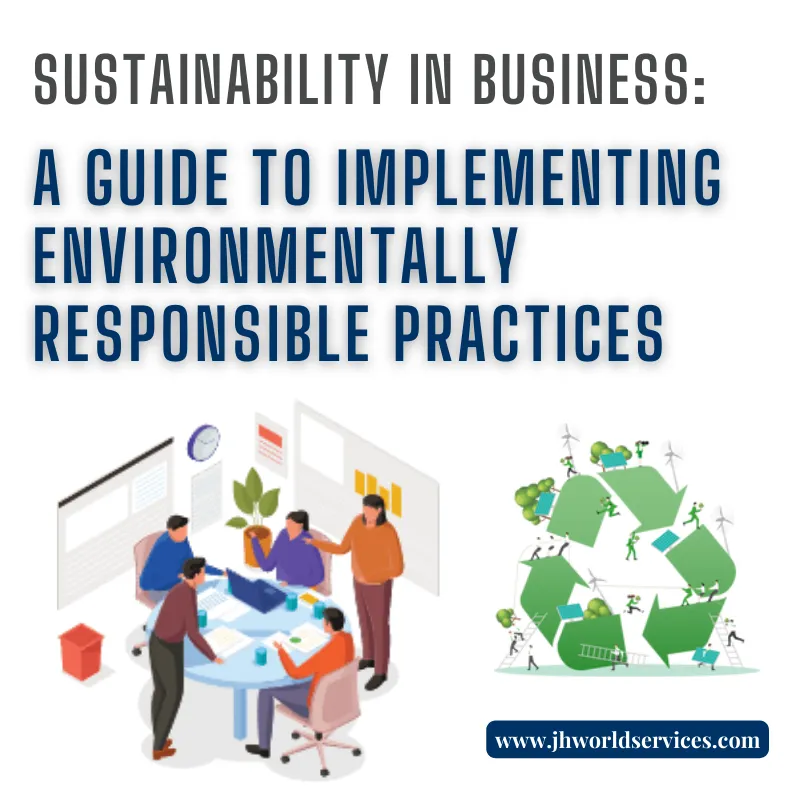In the contemporary business landscape, sustainability has emerged as a critical factor not only for corporate success but also for the well-being of our planet. As consumers become more environmentally conscious, companies are recognizing the importance of adopting sustainable practices. This article delves into the significance of sustainability in the business environment and provides valuable insights on how companies can implement environmentally responsible practices.

Understanding the Relevance of Sustainability
The Evolution of Corporate Social Responsibility (CSR)
Historically, businesses focused primarily on profit generation without necessarily considering their impact on the environment. However, with the growing awareness of climate change and environmental degradation, the concept of Corporate Social Responsibility (CSR) has gained prominence. CSR emphasizes a company’s responsibility to operate ethically, contribute positively to society, and minimize its environmental impact.
Benefits of Embracing Sustainability
1. Positive Brand Image
In the contemporary marketplace, consumers are increasingly inclined to support businesses that actively prioritize sustainability. The adoption of environmentally responsible practices is not only a conscientious move for the planet but also a strategic approach to enhancing a company’s brand image and attracting eco-conscious consumers. From implementing eco-friendly packaging solutions to reducing carbon footprints in the supply chain, businesses can make substantial strides toward sustainability. Incorporating renewable energy sources, minimizing waste generation, and embracing ethical sourcing practices contribute not only to environmental preservation but also to building a positive brand reputation. As sustainability becomes a defining factor in consumer choices, companies that commit to responsible practices are poised to not only meet market expectations but also contribute to a more sustainable future.
2. Cost Savings through Resource Efficiency
The implementation of sustainable practices not only aligns businesses with environmental stewardship but also frequently leads to enhanced resource efficiency, translating into substantial cost savings. Companies embracing sustainability can reap financial benefits across various aspects of their operations. Energy conservation measures, such as adopting energy-efficient technologies and practices, not only reduce environmental impact but also trim down utility bills. Similarly, strategies for waste reduction, reuse, and recycling not only contribute to a greener planet but also mitigate disposal costs for businesses. By optimizing resource use, companies can create a positive ripple effect, driving both economic efficiency and environmental responsibility. In essence, the commitment to sustainability not only serves as a moral imperative but also proves to be a prudent financial decision for forward-thinking businesses.
3. Regulatory Compliance
Governments worldwide are increasingly implementing environmental regulations. Embracing sustainability ensures that businesses remain compliant with these regulations, avoiding legal issues and potential fines.
Implementing Environmentally Responsible Practices
1. Conducting a Sustainability Audit
Before implementing sustainable practices, companies should conduct a comprehensive sustainability audit. This involves assessing current operations, identifying areas of improvement, and setting realistic sustainability goals.
2. Reducing Ecological Footprint
a. Energy Efficiency
Implementing energy-efficient technologies and practices is a key step in reducing a company’s ecological footprint. This includes utilizing renewable energy sources, optimizing lighting systems, and investing in energy-efficient equipment.
b. Waste Reduction and Recycling
Companies can minimize their environmental impact by implementing waste reduction strategies and promoting recycling. Establishing recycling programs within the workplace encourages employees to participate in sustainable initiatives.

3. Enhancing Resource Efficiency
a. Sustainable Supply Chain Management
Adopting a sustainable supply chain is crucial for companies committed to environmental responsibility. This involves working with suppliers who adhere to ethical and eco-friendly practices.
b. Water Conservation
Implementing water conservation measures, such as efficient irrigation systems and water recycling, is essential for businesses looking to enhance resource efficiency.
4. Contributing to Environmental Conservation
a. Corporate Philanthropy
Companies can actively contribute to environmental conservation through philanthropic initiatives. Supporting organizations focused on reforestation, wildlife preservation, or clean energy projects aligns with sustainable business practices.
b. Educating Stakeholders
Educating employees, customers, and stakeholders about the importance of sustainability fosters a culture of environmental responsibility. This can lead to widespread adoption of sustainable practices both within and outside the organization.
Conclusion
In conclusion, the integration of environmentally responsible practices is no longer an option but a necessity for businesses aiming to thrive in the long term. Sustainability not only benefits the planet but also enhances brand reputation, reduces costs, and ensures regulatory compliance. By conducting sustainability audits, reducing ecological footprints, enhancing resource efficiency, and contributing to environmental conservation, companies can play a pivotal role in creating a sustainable future.
Recuerde, el viaje hacia la sostenibilidad está en curso. Las empresas deben reevaluar y mejorar continuamente sus prácticas para adaptarse a las dinámicas ambientales cambiantes y a las expectativas de los consumidores. Al hacerlo, las empresas pueden posicionarse como líderes en el movimiento global hacia un futuro más sostenible y consciente del medio ambiente.

